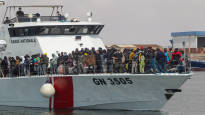European leaders agreed on a partnership agreement with Tunisia on Sunday, linking economic and trade relations to immigration.
Tunisia and the representatives of the European Union agreed on Sunday evening that Tunisia will start curbing the arrival of migrants across the Mediterranean. Tunisia has become the most common departure point for migrants in North Africa.
President of the EU Commission Ursula von der LeyenPrime Minister of Italy Giorgia Meloni and the Prime Minister of the Netherlands Mark Rutte agreed with the Tunisian president Kais Saiedin with also about closer economic and trade relations and cooperation in green energy.
However, the most important thing for the Europeans was to prevent human smuggling and the arrival of migrants across the Mediterranean. The example was the agreement made with Turkey in 2016 – although there were problems in its implementation.
The idea is that Tunisia either prevents crossing the Mediterranean or takes back migrants from Europe. In return, Brussels promises Tunisia more than one billion euros in various financial aid. In practice, the EU has to pay clear money, because the countries of North Africa cannot be obliged to bear the costs of migration alone.
The EU does not give money directly to the Tunisian administration, but for investment projects. For example, Tunisia will be included in the Erasmus student exchange and the country’s digital and water distribution network will be improved with the support of the EU. About one hundred million euros will be put into preventing human smuggling and border control.
Tunisia’s economic situation is very unstable, and it has been negotiating for a long time for support from the International Monetary Fund (IMF). The country benefits from the EU agreement, because its access to the IMF support program becomes easier at the same time.
NGOs are criticized migration agreement in advance, because the Tunisian authorities treat people from sub-Saharan countries harshly. The Tunisian opposition again reviews EU for whitewashing the country’s current leadership with the help of a partnership agreement.
Immigration has been one of the most difficult topics in EU cooperation for decades. Last June, the heads of states and governments discussed the issue at their summit.
Around 330,000 unauthorized border crossings were detected at the EU’s external borders last year, which is 64 percent more than the previous year and the highest number since 2016.
More on the topic:
The sinking of a migrant boat off Greece in June was one of the biggest tragedies in the Mediterranean.
Fundamental Finns want to tighten work-related immigration – in Italy, the right-wing government works quite differently.
The number of migrants has quadrupled in the Mediterranean – Watch ‘s video report on Lampedusa.
